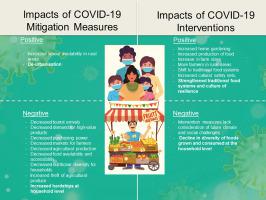Agricultural Systems ( IF 6.1 ) Pub Date : 2021-02-25 , DOI: 10.1016/j.agsy.2021.103099 Viliamu Iese 1 , Morgan Wairiu 1 , Gordon M Hickey 2 , David Ugalde 3 , Diana Hinge Salili 1 , John Walenenea 1 , Tammy Tabe 1 , Milton Keremama 1 , Chris Teva 1 , Otto Navunicagi 1 , Jioje Fesaitu 1 , Robson Tigona 1 , Deeksha Krishna 4 , Hirdesh Sachan 4 , Nigel Unwin 5 , Cornelia Guell 6 , Emily Haynes 6 , Filipe Veisa 1 , Linda Vaike 1 , Zina Bird 1 , Michael Ha'apio 1 , Nasoni Roko 1 , Soane Patolo 7 , Annika Rose Dean 8 , Sashi Kiran 9 , Pitakia Tikai 10 , Jowalesi Tuiloma 11 , Siosiua Halavatau 12 , Judith Francis 13 , Alastair Christopher Ward 1

|
CONTEXT
COVID-19 mitigation measures including border lockdowns, social distancing, de-urbanization and restricted movements have been enforced to reduce the risks of COVID-19 arriving and spreading across PICs. To reduce the negative impacts of COVID-19 mitigation measures, governments have put in place a number of interventions to sustain food and income security. Both mitigation measures and interventions have had a number of impacts on agricultural production, food systems and dietary diversity at the national and household levels.
OBJECTIVE
Our paper conducted an exploratory analysis of immediate impacts of both COVID-19 mitigation measures and interventions on households and communities in PICs. Our aim is to better understand the implications of COVID-19 for PICs and identify knowledge gaps requiring further research and policy attention.
METHODS
To understand the impacts of COVID-19 mitigation measures and interventions on food systems and diets in PICs, 13 communities were studied in Fiji and Solomon Islands in July-August 2020. In these communities, 46 focus group discussions were carried out and 425 households were interviewed. Insights were also derived from a series of online discussion sessions with local experts of Pacific Island food and agricultural systems in August and September 2020. To complement these discussions, an online search was conducted for available literature.
RESULTS AND CONCLUSIONS
Identified impacts include: 1) Reduced agricultural production, food availability and incomes due to a decline in local markets and loss of access to international markets; 2) Increased social conflict such as land disputes, theft of high-value crops and livestock, and environmental degradation resulting from urban-rural migration; 3) Reduced availability of seedlings, planting materials, equipment and labour in urban areas; 4) Reinvigoration of traditional food systems and local food production; and 5) Re-emergence of cultural safety networks and values, such as barter systems. Households in rural and urban communities appear to have responded positively to COVID-19 by increasing food production from home gardens, particularly root crops, vegetables and fruits. However, the limited diversity of agricultural production and decreased household incomes are reducing the already low dietary diversity score that existed pre-COVID-19 for households.
SIGNIFICANCE
These findings have a number of implications for future policy and practice. Future interventions would benefit from being more inclusive of diverse partners, focusing on strengthening cultural and communal values, and taking a systemic and long-term perspective. COVID-19 has provided an opportunity to strengthen traditional food systems and re-evaluate, re-imagine and re-localize agricultural production strategies and approaches in PICs.
中文翻译:

COVID-19 对太平洋岛国 (PIC) 农业和粮食系统的影响:来自斐济和所罗门群岛社区的证据
语境
已经实施了 COVID-19 缓解措施,包括边境封锁、社会疏远、去城市化和限制行动,以降低 COVID-19 到达并在太平洋岛国传播的风险。为了减少 COVID-19 缓解措施的负面影响,各国政府采取了一系列干预措施来维持粮食和收入安全。缓解措施和干预措施都对国家和家庭层面的农业生产、粮食系统和饮食多样性产生了一系列影响。
客观的
我们的论文对 COVID-19 缓解措施和干预措施对太平洋岛国家庭和社区的直接影响进行了探索性分析。我们的目标是更好地了解 COVID-19 对太平洋岛国的影响,并确定需要进一步研究和政策关注的知识差距。
方法
为了解 COVID-19 缓解措施和干预措施对太平洋岛国粮食系统和饮食的影响,2020 年 7 月至 8 月对斐济和所罗门群岛的 13 个社区进行了研究。在这些社区中,开展了 46 次焦点小组讨论,并对 425 户家庭进行了调查。采访过。见解还来自于 2020 年 8 月和 2020 年 9 月与太平洋岛屿粮食和农业系统当地专家举行的一系列在线讨论会。为了补充这些讨论,我们在线搜索了可用文献。
结果和结论
已确定的影响包括:1) 由于当地市场衰退和无法进入国际市场,农业生产、粮食供应和收入减少;2) 土地纠纷、高价值农作物和牲畜被盗、城乡迁移导致的环境退化等社会矛盾加剧;3) 城市地区幼苗、种植材料、设备和劳动力的供应减少;4) 重振传统粮食系统和当地粮食生产;和 5)再-出现文化安全网络和价值观,例如易货系统。农村和城市社区的家庭似乎对 COVID-19 做出了积极反应,增加了家庭菜园的粮食产量,尤其是块根作物、蔬菜和水果。然而,农业生产的有限多样性和家庭收入的减少正在降低家庭在 COVID-19 之前就已经很低的饮食多样性得分。
意义
这些发现对未来的政策和实践有许多影响。未来的干预措施将受益于更加包容不同的合作伙伴,侧重于加强文化和社区价值观,并采取系统和长期的观点。COVID-19 为加强传统粮食系统以及重新评估、重新构想和重新定位太平洋岛国的农业生产战略和方法提供了机会。











































 京公网安备 11010802027423号
京公网安备 11010802027423号